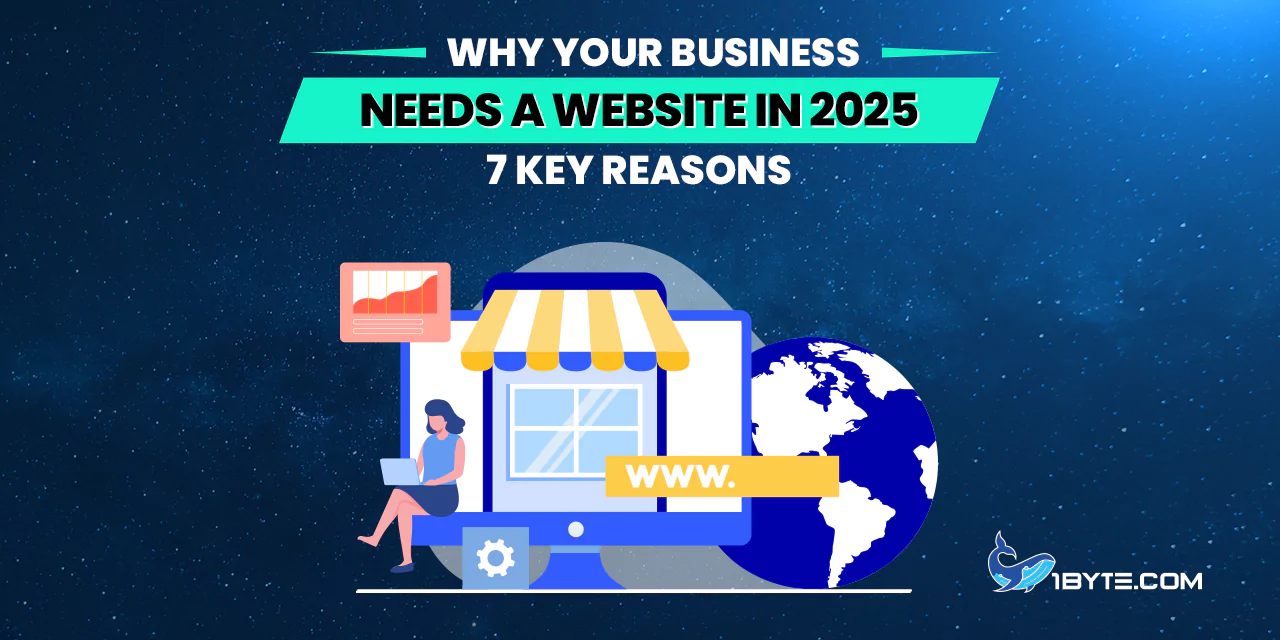- 1. Establishes Credibility and Trust
- 2. Increased Visibility and Online Reach
- 3. 24/7 Accessibility and Customer Convenience
- 4. Cost-Effective Marketing and Advertising
- 5. Increased Sales Opportunities (Including E-commerce)
- 6. Competitive Advantage and Industry Relevance
- 7. Control Over Your Brand and Customer Insights
- Conclusion
A strong online presence is now a basic requirement for businesses in 2025. Nearly everything has moved online, from how people find services to where they shop. Globally, 5.65 billion people – about 68.7% of the world’s population – use the interne. With such a vast digital audience, the question of why your business needs a website has a simple answer: it is essential to reach and engage modern customers. In fact, over 81% of shoppers conduct online research before making a purchase. If a business isn’t visible online, it risks being invisible to a huge majority of its potential customers. This article from 1Byte breaks down seven key reasons every business needs a website in 2025, backed by new statistics, reports, and specific examples.
1. Establishes Credibility and Trust

Having a website makes a business appear professional and credible. Consumers today often judge a company by its online presence before ever making contact. First impressions matter – 94% of those impressions are based on website design. In other words, a modern, well-designed site immediately signals that a business is legitimate and trustworthy. Design quality even influences how credible the site appears: 75% of a website’s credibility comes from its design. For example, a sleek and informative homepage with clear branding will instill more confidence than a business with no website or a poorly designed page.
A website also provides a centralized place to display official information (like your business history, address, or client testimonials). This helps build trust with new customers. Surveys show that 8 in 10 consumers trust a business with a website more than one with only social media pages. Shoppers see an official website as a sign that the company is real and committed to its customers. On the other hand, if someone searches for your business and finds no website, they might question if the business exists or is still active. In 2025, people expect to find contact info, product details, and hours on a company’s website, and 86% of visitors want to see information about products or services right on the homepage. Failing to meet these expectations can cause potential customers to look elsewhere. Therefore, a website is crucial for establishing credibility and making a strong first impression.
2. Increased Visibility and Online Reach
A website dramatically increases the visibility of your business. Modern consumers use search engines as their first choice when searching for products or services. Every day, 87% of smartphone users make use of a search engine and many find new businesses in this way. In fact, 51% of smartphone users have discovered a new company or product while doing research on their phones. If you have a website for your business that is optimized for search, it can show up in those results and draw new customers to your business. Without a site, you simply aren’t going to show up in most online searches, which means you’re missing out on a huge channel for discovery.
Crucially, too, online search is not just global – it’s local too. Studies show 80% of US consumers search for local businesses online every week and 32% search on a daily basis. In addition, nearly half of all searches on Google are looking for local information. This includes people searching for “restaurants near me” or “best plumber in [town]”. If you don’t have a website (and you’re not in Google) your business probably won’t appear in these search results. On the flip side, if you have a website and it has good local SEO (your location and services listed) it will help you get found by customers in your area. Even internationally, your reach is expanded: with a website, you can reach an international audience beyond the boundaries of your location. In short, being online is essential for your business to be found by the huge number of people who will search the internet first when they are searching for what they need.
3. 24/7 Accessibility and Customer Convenience
Unlike a physical store or office that’s closed at the end of the day, a website allows your business to be on 24-hours a day, 7 days a week. Customers can come to your site whenever they want to learn about your offerings and contact you, or even to make purchases if you offer e-commerce. This constant availability appeals to contemporary consumer habits. Many people shop and shop outside of traditional business hours, whether late at night or early in the morning. With a website, your business information and online store front is open 24/7 to satisfy this demand.
Being always accessible online also means serving customers on their schedule, which is extremely beneficial for convenience. For example, imagine that a potential client hears about your services at 10 PM and wants more details right away. If you have a website, they are going to be able to find your portfolio, FAQs, or pricing, right then and there. If not, you may lose that lead overnight. Research shows that customers move on quickly if they can’t find what they need – 61% will go to another site if they don’t find information within five seconds. By offering fast response on your site (with obvious listed information or even chatbots and contact forms), you can keep impatient visitors around. Additionally, a website can be used to host self-service functionality such as appointment bookings or order tracking, or downloadable resources, further enhancing the customer experience. In 2025 convenience is King and a website is what equips your business to serve your customers whenever and wherever it’s convenient for them.
4. Cost-Effective Marketing and Advertising
Your website doubles as a powerful marketing tool that is often more cost-effective than traditional advertising. Once your site is up, it can continuously attract visitors through search engine optimization (SEO), social media referrals, and content marketing – without the ongoing costs of, say, printing flyers or running frequent paid ads. A well-optimized site can rank on Google for keywords related to your business, essentially providing free traffic and exposure. Organic search engine traffic can be extremely valuable, driving over 1,000% more traffic than organic social media in many cases. This means people find you through Google searches at a much higher rate than through unpaid social media posts, giving you more bang for your marketing buck.
Additionally, your website is a hub for the marketing of your business in the form of content. By sharing blog posts, how to articles, or customer testimonials on your site, you can attract and educate potential customers. Companies that take advantage of content on their websites often have improved results – for example, businesses who blog generate 67% more leads in a month than those that don’t. Even simple features on your site can help increase marketing success. A call-to-action (CTA) on your homepage (such as “Contact us for a quote” or “Sign up for our newsletter”) can help capture the visitor’s interest and convert it into inquiries or subscriptions. Yet surprisingly 70% of small businesses don’t even have a CTA on their homepage, losing out on easy opportunities. By having your own site, you are able to put these tactics into action and measure their effectiveness using analytics tools. In short, a website enables even small businesses to conduct targeted marketing based on data, at a low cost, which will help you reach the right people and measure the results.
5. Increased Sales Opportunities (Including E-commerce)
A website can be used directly for sales, in both offline and online. At the very least your site can generate lead and inquiry which result in sales – for instance a contact form to request a quote can fill your sales pipeline. But in addition to that, if your business sells products (or can sell gift cards, bookings, etc.) then setting up e-commerce on your website opens up an enormous revenue channel. Online shopping is still growing every year: Global e-commerce retail sales are expected to reach $7.4 trillion in 2025. Moreover, 85% of consumers across the world now shop online, which means that most people are comfortable shopping online from websites. By 2025, online purchasing has become so common that the businesses that do not have any e-commerce presence are at least risk of losing out on sales to more digitally savvy competitors.
Even service businesses benefit from a website as it helps to represent offerings and prompt a decision to buy. For example, a consulting firm can list its services and success stories of its clients and prompt the visitor to schedule a consultation. Many consumers make decisions quickly once they have found a product they want: in one survey, two-thirds of shoppers said they would make a purchase online within a week of discovery of a product they like. A website makes it easy for them to purchase from you immediately, or make contact with you at least to complete the sale. In addition, having online reviews or case studies on your site can have an impact on purchasing. 93% of consumers report online reviews influence their buying decisions, and so including testimonials can have a direct impact on sales. Ultimately, a website does not mean merely a digital brochure – it can be a complete-fledged sales platform that will increase your revenue streams and capture sales 24/7.
6. Competitive Advantage and Industry Relevance

Having a website is no longer a luxury – it’s standard practice, and you’re at a disadvantage if you don’t have one. As of 2023, 73% of small businesses in the U.S. have a website and many of the remaining businesses plan to build a website in the near future. This means that if your business doesn’t have a site, you’re competing in the minority that doesn’t have a website online. Customers may decide to pick up a competitor because they have an informative website and you do not. In contrast, if you are able to build a great website you can shine above and even outcompete larger competitors through clever strategy. For example, a local shop with a good website may come up in the results above a bigger chain that does not have good SEO. The web levels the playing field: it allows any business to get access to a broad audience and present unique value with the right approach.
Having a website also tells people that your business is modern and relevant. In industries that are in the process of digital transformation, having a web presence demonstrates that you are keeping up with trends and customer preferences. During the Covid-19 pandemic, for example, business enterprises with an online ordering or virtual service were able to retain customers, whereas those who did not have an online channel found themselves in difficulties. Even as things stand, consumers expect businesses to provide at least basic information online. If industry peers all have websites with rich content and you don’t, your business will be seen as possibly outdated or less credible as a result. Put simply, a website is part of keeping up with the competition in 2025. It enables you to join the net marketplaces, place your business on Google Map, connect with social and more. By doing so, you keep your visibility where your competitors are and tell your customers you’re just as good and professional as anyone else in the field.
7. Control Over Your Brand and Customer Insights
One reason that is often overlooked as to why your business needs a website is the control and insights that it gives you. When you have your own website, you have total control over what can go on it, how it looks, and what it says – not like on social media websites where you are beholden to another person’s rules and algorithms. This control allows you to create the story for your brand. You can update information in real time, add your brand’s personality through custom design, and give your information accurately and up to date. For instance, if you have a special promotion or if you’re changing up your hours, you can make that information clear on your website. There’s no risk of a post being buried in a social feed or a platform altering the way it is laid out. In essence your website is the online home of your business and you have the keys.
Owning a website also provides you with data of great value regarding your customers. With the help of tools such as Google Analytics or other web analytics, you can know which pages people visit the most, how they discovered your site, and what kind of content interests them. These insights are gold to improve your business strategy. If you discover that a particular page for a product is viewed the greatest number of times, you know that item is of interest (and you could stock more of it or promote it further). If lots of visitors drop off at your pricing page, then maybe the pricing is not clear and needs to be adjusted. Traditional offline businesses don’t enjoy this type of instant feedback, but a website does.
In fact, 43% of small business owners are seeking to invest in the performance of their website (speed, SEO, etc.) because they understand the importance that the web plays in growth. By analyzing your site’s data, you make informed decisions – perhaps discovering new segments of customers or what services are popular, and continue to refine the customer experience. This data-driven approach can help to lead to better marketing campaigns, increased customer satisfaction, and ultimately, sales over time. In summary, a website is not only a great way to strengthen your brand control but also a listening tool that you can use to understand and serve your customers better.
Leverage 1Byte’s strong cloud computing expertise to boost your business in a big way
1Byte provides complete domain registration services that include dedicated support staff, educated customer care, reasonable costs, as well as a domain price search tool.
Elevate your online security with 1Byte's SSL Service. Unparalleled protection, seamless integration, and peace of mind for your digital journey.
No matter the cloud server package you pick, you can rely on 1Byte for dependability, privacy, security, and a stress-free experience that is essential for successful businesses.
Choosing us as your shared hosting provider allows you to get excellent value for your money while enjoying the same level of quality and functionality as more expensive options.
Through highly flexible programs, 1Byte's cutting-edge cloud hosting gives great solutions to small and medium-sized businesses faster, more securely, and at reduced costs.
Stay ahead of the competition with 1Byte's innovative WordPress hosting services. Our feature-rich plans and unmatched reliability ensure your website stands out and delivers an unforgettable user experience.
As an official AWS Partner, one of our primary responsibilities is to assist businesses in modernizing their operations and make the most of their journeys to the cloud with AWS.
Conclusion
In 2025, having a business website is as fundamental as having a phone number. Each of these seven reasons – from establishing credibility to gaining customer insights – underscores why your business needs a website in today’s digital-first world. A website serves as your always-open storefront, marketing platform, sales engine, and credibility card all at once. Crucially, it aligns your business with modern consumer behavior: people are online and expect you to be there too. The investment in a good website pays off through greater trust, wider reach, and more opportunities to grow. Businesses that embrace this continue to thrive, while those that delay risk falling behind. In a world where over 5 billion people are online and 81% of shoppers research online before buying, an effective website is no longer optional – it’s a key to business survival and success in 2025 and beyond.

